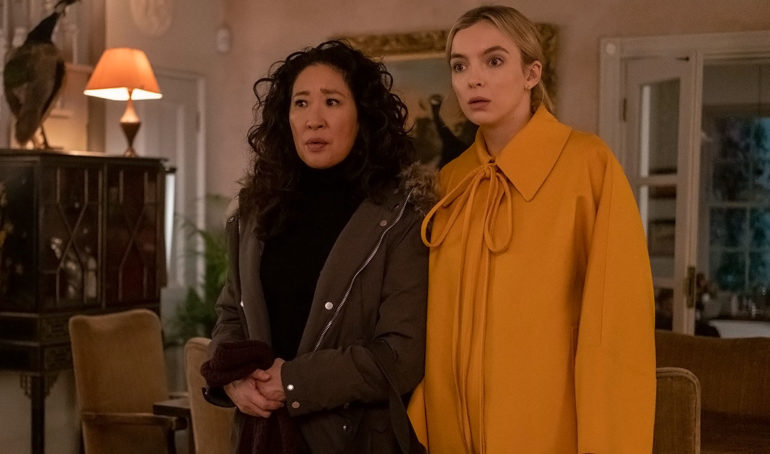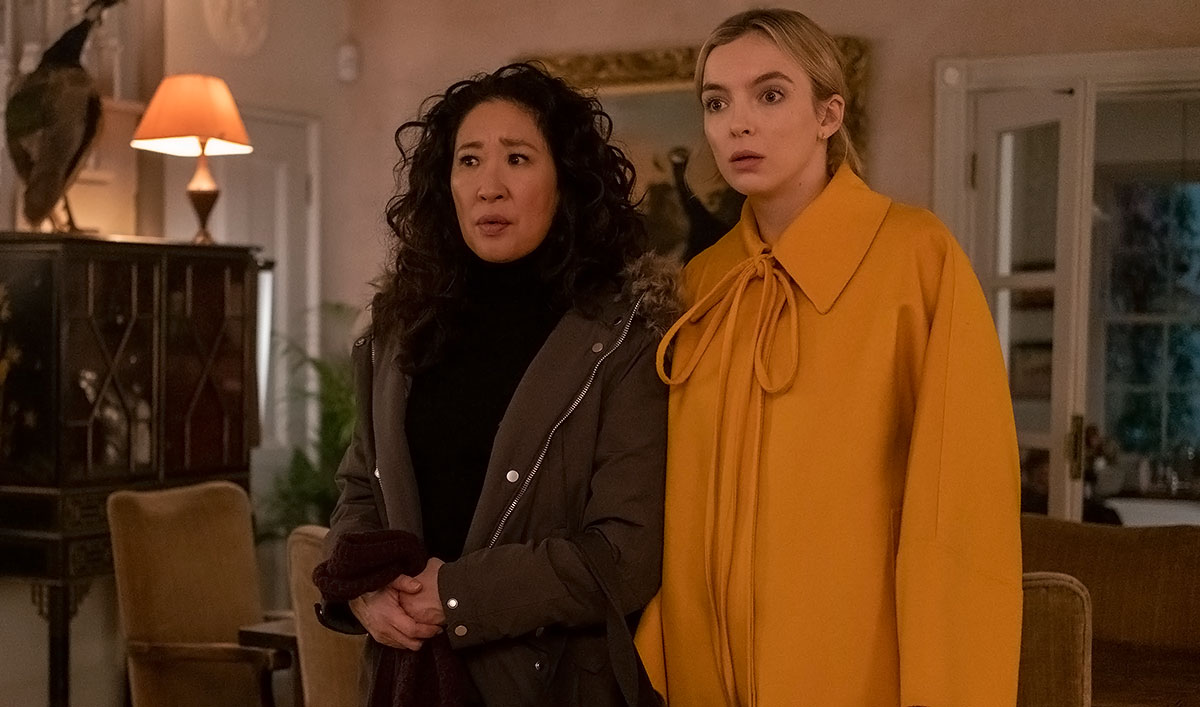This season of Killing Eve has some painfully on-the-nose music choices, to the point where it comes full circle and I have to admire the craft of finding songs whose lyrics describe what’s going on onscreen quite so literally. Making sound and image match up past the point of common sense is usually a tendency of self-satisfied student films (and one beautifully parodied by The Day Today), not of flagship BBC productions – and especially not ones which have cracked the transatlantic market.
In and of itself this is a fairly petty complaint. It’s background music, after all, a fairly small part of the coherent whole. And we’re not watching Killing Eve for the music of all things, we’re watching it for the international intrigue and simmering sexual tension, so why even mention it? The answer is because the music sees the show taking the obvious choices, and this is an avenue it plunges down time and time again.
The third season of Killing Eve is building on a lot of the same dynamics as the second, with Villanelle’s outlandish, Dionysian high-life assassinations contrasted dramatically with Eve’s grimy, Apollonian, le Carre-y investigations, seeming more like a James Bond/Arthur Dent matchup than ever before. Eve is such a mess that at times you fear ‘Killing Eve’ might turn out to mean ‘with poor life choices’, while Villanelle’s outfits get ever more outlandish, and she herself is becoming yet more of a massive little girl.
Villanelle’s sudden desire to get back to her family has been seeded, sort of – I know, because in the ‘previously on’ they pulled out every snippet from seasons 1 and 2 that even hinted at it. But it does fit, not least because she’s cultivated the massive little girl image so convincingly, and it adds a vaguely Oedipal edge to her relationships with both Konstantin (the show’s obvious daddy figure, even if only by process of elimination) and Eve herself, who without wishing to be unpleasant is probably old enough that Villanelle could be her daughter.
Despite this, it’s Eve who is coming to take after Villanelle, and by this I mean that her active burning-out is making her increasingly venal and disregarding of others. This is always dangerous territory for a protagonist. Villanelle gets away with it because of the massive little girl thing, and because of the gloss and shiny objects of her James Bondian life. Coming from Eve, as she lurks around a dingy office and refuses to shower, it dares the audience to keep trying to care.
Another of the recurring themes this season returns to yet more strongly is the inversion of gender roles – not in a ‘planet of the Amazons’ way, but rather putting women front and centre while marginalising men. Chiefly, there’s some very prominent examples of men being killed off or seriously injured entirely to stimulate women’s plot arcs, a dynamic which is usually the other way round and is disparagingly called ‘fridging’ (named for a notorious issue of Green Lantern, when Greenie came home to discover the villain du jour had killed his girlfriend and shoved her in the fridge).
It would be easy to believe that this is a subtle but strong statement about gender, the spirits of a thousand neglected Bond girls all screaming ‘this is how it feels, you bastards, this is how it feels’. But then the show kills off a woman – not an extra or that week’s assassination target, but a major named character with more than five lines – for, it seems, no greater thematic reason than that their plot’s over, and it calls everything that’s gone before into question, and not in a good way.
In previous seasons, even if a guest star’s mortal coil only lasted one episode, they at least had a bit of meat in their role. We needed some reason to want to see them dead, after all. And they were actually being killed, rather than shruggingly giving up on life, a la Padme in Return of the Sith – who was also a victim of plot requirements, and was a straightforward example of a fridging.
Whether these bumping-offs actually make sense or not, each one still blows another hole in the character roster, holes which really aren’t filled effectively. The new additions of this season are very thin gruel, essentially cardboard cut-outs there to react to Eve/Villanelle’s wacky antics, and worse still unable to remember the life lessons they’ve ham-handedly conveyed from one scene to the next. There’s nobody remotely on par with, for instance, Fiona Shaw’s unflappable Carolyn – and what aggravates this is there’s at least one new addition who easily could have been.
But as their reactionary qualities suggest, the rest of the character roster is all a sideshow to the main attraction of Killing Eve, the relationship between Jodie Comer’s Villanelle and Sandra Oh’s Eve. So here, devoting more attention and plotting to that, is a clear obvious choice. We’ve known since day one that this was the core concept, but that becomes a major Achilles’ heel, as the problem here is that there simply isn’t enough of it.
The Yin-Yang divide between Eve and Villanelle needn’t necessarily be an actual physical divide, but for a lot of this season it is – perhaps too much, considering that the chemistry between Comer and Oh is by far the show’s greatest asset. They spend a great deal of time off doing their own thing, which undermines the obsession we’re told they share. I say ‘told’ because there are times when they themselves seem to forget about it. When they are actually obsessing, let alone when they’re on screen together, it’s suitably spicy, but it seems as if the show is doing its utmost not to provide too much of this.
It’s a recurring problem in any sort of drama that invokes sexual tension that if the characters actually do give in to their throbbing biological urges, it’s a bit of an own goal, as then the tension is gone. Having a will-they-won’t-they pair finally get together is considered one of the classic forms of jumping the shark for exactly this reason.
Likewise, if anyone did finally kill Eve, the creators would then be left holding the bloody, severed stump of a show. Last season’s fake-out was appropriate climax material, but nobody seriously believed Eve was dead. So the narrative is obliged to tease either of the obvious natural conclusions as hard as possible, while not actually leaping over the edge – because to do so would kill the show stone dead. And here above all else is an obvious choice which does not improve the viewing.
It’s obvious why the show seems so reticent to give Villanelle and Eve too much screen-time together, especially what we’ve seen happens to characters who reach the end of their natural arc. Nonetheless, while creators can’t simply give the audience everything they want, there are better ways of doing that than stringing an hour’s worth of material out over eight episodes and plugging the gaps with stuff that wasn’t really thought through.
Some of the coverage you find on Cultured Vultures contains affiliate links, which provide us with small commissions based on purchases made from visiting our site.


